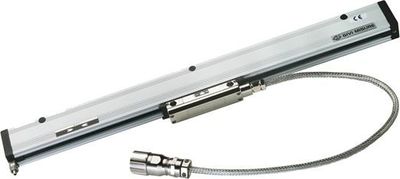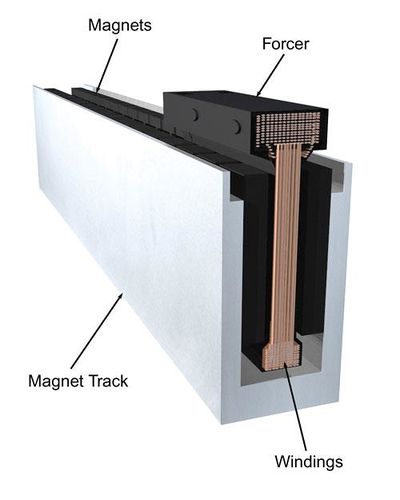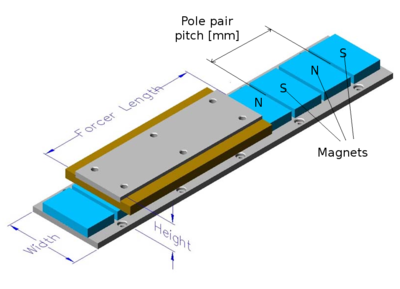Configuring linear servo motor
Linear servo motor is an actuator producing linear force or motion and is constructed from a linear motor and a linear feedback device such as linear encoder. Compared to rotary motor with lead screw, the main benefits of linear servos are very high speeds and zero mechanical backlash. The typical drawbacks are less available force and possibly high design time effort.
Linear servo motor is electrically equivalent to a rotary motor, so drive sees no difference between the two. However, as drive parameters are entered for rotary motor only, they need some calculations to suit for linear motor.
Configuration
Preparations
Needed parameters of linear motor:
- Magnetic pole pair pitch (this equals 2x pole pitch)
- Forcer winding specifications:
- Maximum currents: continuous and peak
- Inductance and resistance
- Thermal time constant (optional but recommended)
Needed linear feedback device parameters:
- Resolution (lines or pulses per millimeter)
Setting parameters
In this step we convert the values so that motor can be driven from a servo drive. The drive is made to believe that the linear motor is rotary motor, so we need to figure out the equivalent rotary motor parameters.
This example works with Granity software. Follow your drive's setup guide for all parts except these:
- Set MT Motor type as 3 phase AC or BLDC motor
- Set MPC Pole count to 2
- Set FBR Feedback device resolution to a value calculated as: Lines per mm*Pole pair pitch. For example if we have a linear encoder with 100 pulses per millimeter and a linear motor with 50 mm pole pair pitch (25 mm pole pitch), we calculate FBR = 100*50 = 5000. Important: check whether encoder resolution is specified as pulses or cycles per mm OR counts per mm - if it's defined as counts per mm (after 4X decoding), then this value needs to be divided by 4 to get pulses per mm which is the correct input value format.
- Set MTC Thermal time constant according to your motor. If the value is unknown, it is recommended to start with low values such as 30 seconds as the forcer of linear motor may have very low time constant. MTC attempts to protect motor from overheating.
- Finally as usual, FBI parameter must be set properly to achieve proper configuration.
It's also a good idea to set AXT type to Linear and set AXS to same as pole pair pitch.
Troubleshooting
If motor refuses to move beyond certain distance from the starting position, check the settings of MPC and FBR. If unsure, try adjusting FBR to higher/lower values (30%-50% steps or so) and see if the travel range increases or decreases.
EMI notice
Especially ironless linear motors are known to leak large amounts of electromagnetic interference due to open construction and lack of Faraday's cage. It may be necessary to use an Edge filter between the drive and motor to reduce the amount of EMI.
In no event the Product Information or parts hereof shall be regarded as guarantee of conditions or characteristics. The Product Information or any part thereof may also not be regarded as a warranty of any kind. No liability of any kind shall be assumed by Author with respect to Product Information or any use made by you thereof, nor shall Author indemnify you against or be liable for any third party claims with respect to such information or any use thereof.
As content of this Wiki may be edited by user community, Granite Devices Oy or it's affiliates do not take any responsibility of the contents of this Wiki. Use information at your own risk. However, Granite Devices staff attempts to review all changes made to this Wiki and keep information trustworthy.
Without written consent, Granite Devices' Products or Intellectual Property shall not be used in situations or installations where living beings, material property, or immaterial property could be harmed by the operation, features or failures of Product. Products may only be used in a way where hazards like moving parts, electric shock, laser radiation, or fire can't be realized even if the content of this Wiki would suggest otherwise.


